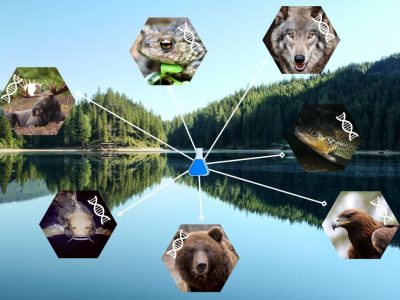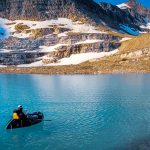PROGRAM SUMMARY
One of Living Lakes Canada’s newest programs, iTrackDNA utilizes a method known as Targeted environmental DNA (eDNA), whereby samples are collected from areas of interest and analyzed for DNA from predefined target species. This monitoring technique is an easier and less invasive method compared to conventional methods for detecting and tracking the movement of species of interest, including invasive species, culturally significant species, and species at risk.
Targeted eDNA
Targeted eDNA is a method for detecting specific organisms in a given environment, such as water, air, soil, or sediment. This method can be applied to monitor biodiversity, detect invasive species, and identify diseases in aquatic environments. It offers a less invasive and more efficient alternative to conventional methods for detecting and tracking certain species, including invasive species, species at risk, and culturally significant species.
iTrackDNA Project
A collaboration between the University of Victoria, Institut national de la recherche scientifique, Genome Canada, non-governmental organizations, First Nations, government, and industry, the iTrackDNA project utilizes Targeted eDNA with quantitative polymerase chain reaction (qPCR) to amplify and identify species of interest.
iTrackDNA is also developing innovative eDNA tools, including assays for detecting priority species in Canadian ecosystems and decision support software for modeling regional biodiversity changes, with a foundation and lens of Indigenous Ecological Knowledge. The project is partnered with First Nations communities that have a particular urgency in obtaining better resource management and decision-making tools.
By 2025, the aim of the program is to have standardized eDNA testing that will be applied in coastal and inland ecological surveys and biosurveillance for mining, forestry, energy, and infrastructure projects; economically important, at-risk and invasive species management; and climate change impact tracking in all Canadian provinces and territories.
The iTrackDNA project is building capacity through innovative, accessible, socially responsible genomics-based analytical eDNA tools for effective decision-making by:
- Supporting the creation of a targeted eDNA detection national standard.
- Building eDNA kits to detect 100 priority invertebrates, fish, amphibians, birds, reptiles, and mammals in Canadian coastal and inland ecosystems.
- Applying 10 eRNA kits for determining bioremediation (the use of microorganisms to consume and break down environmental pollutants) effectiveness.
- Generating decision support software for modelling regional biodiversity changes integrating Indigenous Ecological Knowledge.
- Developing an eDNA training, certification, and inter-lab validation framework for consultants, researchers, regulators, and managers.
- Producing a guidance document on eDNA based methods integration into management, policy & regulations.
A list of priority taxa assays that have been created can be found on the Helbing Lab website. This list will be updated quarterly to reflect assay completion.
Our Role
Living Lakes Canada has been trained in iTrackDNA sampling and filtration methods by the Helbing lab and J Hobbs Ecological Consulting LTD. Living Lakes Canada plays a role in facilitating the training of community groups, First Nations, and other environmental monitors on Targeted eDNA protocols. We support interested organizations with their targeted eDNA sampling, offering knowledge in site selection, and monitoring where appropriate. We assist with project facilitation, through activities like connecting groups with experts and funding sources.
CONTACT
We are encouraging anyone interested in the application of Targeted eDNA in understanding the health of their water systems to contact us. If you are interested in collaborating to support the understanding of Canada’s biodiversity in a changing climate please email us at biomonitoring@livinglakescanada.ca.

News and Updates
Measuring Water Heath with Bioindicators (pg. 24) – Water Canada Magazine, Mar/Apr 2024
Water & Wildlife: Piloting new technology through an Indigenous lens – Living Lakes Canada, Mar 20 2023
iTrackDNA: Our Biosphere Revealed – iTrackDNA, Nov 2 2022
Resources
- Visual description of iTrack DNA (by the University of Victoria and the Institut National de la Recherche Scientifique)
- Environmental DNA Standardization Needs for Fish and Wildlife Population Assessments and Monitoring
- iTrackDNA: Our Biosphere Revealed | Notre Biosphère Révélée
- iTrack DNA Training Video Series (7 videos)







